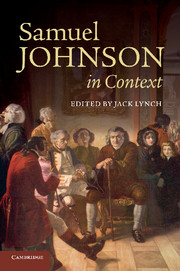Book contents
- Frontmatter
- Contents
- Illustrations
- Contributors
- Preface
- Chronology
- Abbreviations
- Part I Life and works
- Part II Critical fortunes
- Part III Contexts
- Chapter 10 America
- Chapter 11 Anglicanism
- Chapter 12 Anthropology
- Chapter 13 Authorship
- Chapter 14 Biography
- Chapter 15 Book trade
- Chapter 16 Clubs
- Chapter 17 Conversation
- Chapter 18 Dictionaries
- Chapter 19 Domestic life
- Chapter 20 Education
- Chapter 21 Empire
- Chapter 22 Essays
- Chapter 23 Fiction
- Chapter 24 History
- Chapter 25 Journalism
- Chapter 26 Law
- Chapter 27 Literary criticism
- Chapter 28 London
- Chapter 29 Medicine
- Chapter 30 Mental health
- Chapter 31 Money
- Chapter 32 Nationalism
- Chapter 33 Philosophy
- Chapter 34 Poetry
- Chapter 35 Politics
- Chapter 36 Scholarship
- Chapter 37 Science and technology
- Chapter 38 Scotland
- Chapter 39 Sermons
- Chapter 40 Shakespeare
- Chapter 41 Slavery and abolition
- Chapter 42 Social hierarchy
- Chapter 43 Theatre
- Chapter 44 Travel
- Chapter 45 Visual arts
- Chapter 46 War
- Chapter 47 Women writers
- Further reading
- Index
Chapter 10 - America
from Part III - Contexts
Published online by Cambridge University Press: 05 June 2012
- Frontmatter
- Contents
- Illustrations
- Contributors
- Preface
- Chronology
- Abbreviations
- Part I Life and works
- Part II Critical fortunes
- Part III Contexts
- Chapter 10 America
- Chapter 11 Anglicanism
- Chapter 12 Anthropology
- Chapter 13 Authorship
- Chapter 14 Biography
- Chapter 15 Book trade
- Chapter 16 Clubs
- Chapter 17 Conversation
- Chapter 18 Dictionaries
- Chapter 19 Domestic life
- Chapter 20 Education
- Chapter 21 Empire
- Chapter 22 Essays
- Chapter 23 Fiction
- Chapter 24 History
- Chapter 25 Journalism
- Chapter 26 Law
- Chapter 27 Literary criticism
- Chapter 28 London
- Chapter 29 Medicine
- Chapter 30 Mental health
- Chapter 31 Money
- Chapter 32 Nationalism
- Chapter 33 Philosophy
- Chapter 34 Poetry
- Chapter 35 Politics
- Chapter 36 Scholarship
- Chapter 37 Science and technology
- Chapter 38 Scotland
- Chapter 39 Sermons
- Chapter 40 Shakespeare
- Chapter 41 Slavery and abolition
- Chapter 42 Social hierarchy
- Chapter 43 Theatre
- Chapter 44 Travel
- Chapter 45 Visual arts
- Chapter 46 War
- Chapter 47 Women writers
- Further reading
- Index
Summary
CO′LONY. n.s. [colonia, Latin]
1. A body of people drawn from the mother-country to inhabit some distant place.
Osiris, or the Bacchus of the ancients, is reported to have civilized the Indians, planting colonies and building cities. Arbuthnot on Coins.
Samuel Johnson’s lifetime circumscribed the most momentous political episode in eighteenth-century English history, the rise and fall of the British empire in North America. His notorious hostility towards America rested on a potent mixture of insular nationalism and cosmopolitan humanitarianism, which fueled his lifelong hatred of imperialism and racism. Few other major English authors wrote more, or more passionately, about America than he did.
Home and colonies
Home undoubtedly came first to Johnson, as it did to his countrymen. Colonists were a new and suspect category of citizenry unknown to ancient common law. In his Dictionary, a definition of land as “Nation; people” is a revealing conflation of soil and subjects, of locality and loyalty. This nativism had feudal origins in the unwritten British constitution for an agrarian society, where landholding meant subsistence and allegiance to the monarch as supreme owner of the island’s real property. The homeland was a largely self-sufficient entity for survival and civilization, and had precedence over extra-territorial concerns of foreign trade and distant empire: “We have at home,” Johnson wrote, “all that we can want, and … we need feel no great anxiety about the schemes of other nations for improving their arts, or extending their commerce” (Works, 10:125).
- Type
- Chapter
- Information
- Samuel Johnson in Context , pp. 93 - 100Publisher: Cambridge University PressPrint publication year: 2011

